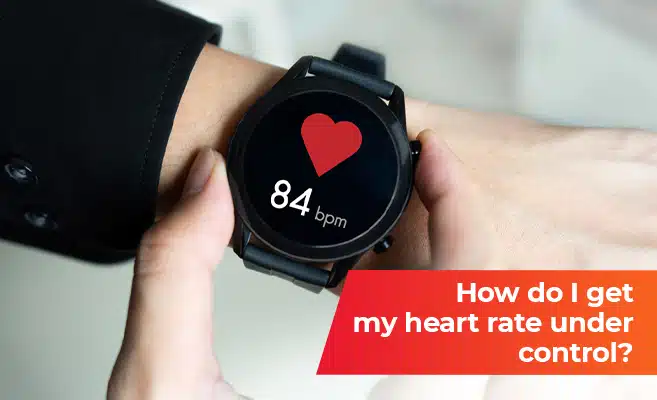How Do I Get My Heart Rate Under Control?

The number of heartbeats per minute a person is having is known as heart rate or pulse. People whose pulse rate is lower resting is a symbol of good health. It provides a view of people’s overall health and helps find potential health issues. Some people might think their heart ticks and works like a clock. But it is a thing to notice how fast the beat changes in an entire day. If you are working out or feeling nervous, the heartbeat will become fast. However, it will slow down if you are sitting still or relaxing.
What is a Healthy Heart Rate?
There are a lot of good factors why people should maintain and keep the pulse rate low. The pulse rate of a resting adult must fall between 60 and 100 beats every minute. However, the rate can vary from person to person on an overall day. A lot of problems can be caused by a pulse rate above normal. Mentioned below are some of the issues that occur if the rate gets too high than usual.
- Weakness
- Lightheadedness
- Chest pain
- Low blood pressure
- Heart pain (myocardial ischemia)
- Fainting
- The flow of blood in the legs and arms in an abnormal way (peripheral hypoperfusion)
How Do Lower or Maintain The Heart Rate?
Regular physical exercise
One of the most effective and easiest ways to gain a long-lasting lower pulse rate is by performing regular physical exercises. The pulse rate can constantly get lower if people stay physically active and fit. Most doctors recommend doing yoga and endurance training every day for around 30 minutes to 45 minutes. However, any kind of physical exercise can be beneficial and will help in maintaining the pulse rate.
Maintaining a balanced body weight
The human body and heart get more stressed if the overall weight of an individual is more. It might result in getting an increased heart rate. For example, if a person’s weight is more, they would not be able to perform exercises or other physical activities. They would feel it very difficult and challenging to perform any exercise. Healthcare professionals suggest that body weight can be a bad predictor of pulse rate; thus, it must be maintained.
Drink plenty of water
The human heart has to work harder if the body is not sufficiently hydrated to stabilize blood flow. Thus, individuals need to intake plenty of water and always stay hydrated. The doctors at PSRI Hospital suggest that the pulse rate can be reduced if an individual consumes 335-millilitre water over 30 minutes. However, if they drink more beverages throughout the day, then it might result in a lower pulse rate.
Consume a balanced and nutritious diet
A healthy, balanced and nutrition-riched diet positively impacts the heart’s health and rate. A good diet should include green vegetables, fresh fruits, cereals, milk, and so on. People must intake the right amount of vitamins, minerals, and other essential nutrients daily. It is the foundation of a good heart rate and will lower it. Rather than all these, fish is also very important to be included in a person’s diet.
Limit the amount of stimulants intake
The consumption of stimulants is responsible for causing an increase in the level of dehydration. As the human body becomes dehydrated, the workload of the heart increases. For example, a high amount of caffeine intake leads to dehydration. It can make the heart get stressed, and the pulse rate might also get affected.
Avoid consuming alcohol
Some researchers suggest that the people who consume alcohol or liquor are more dehydrated than the others. However, more research is still to be done on the same. Alcohol is a toxin, and the human body needs extra effort to process and remove it. Thus, it might increase heart rate.
What are The Major Causes Behind The Rise in Heart Rate?
Sometimes people face sinus tachycardia conditions. It is a situation in which the heart rate gets a sudden spike from the abnormal impulses (faster than usual) from the sinus nodes. People feel their heartbeat is running fast, but it’s normal. Sinus tachycardia can occur due to various conditions mentioned below are some of them.
- Anxiety
- Fright
- Fever
- Some medications
- Street drugs
- Strenuous exercise
- Severe emotional distress
- It can also be a result of the following reasons:
- Severe bleeding
- Anaemia
- Damage from heart muscle due to a heart attack or heart failure
The Bottom Line
An increased heart rate is usually a result of the natural physical response to the stressors, which can be environmental or others. Sometimes, the pulse rate might be high for a long time. It might be an outcome of the underlying medical conditions. If someone’s average pulse rate is unusually high because of an underlying medical condition, they might need an immediate medical checkup and treatment. Visit our best cardiac hospital in Delhi for consultation.

 Book An Appointment
Book An Appointment Virtual Consultation
Virtual Consultation





